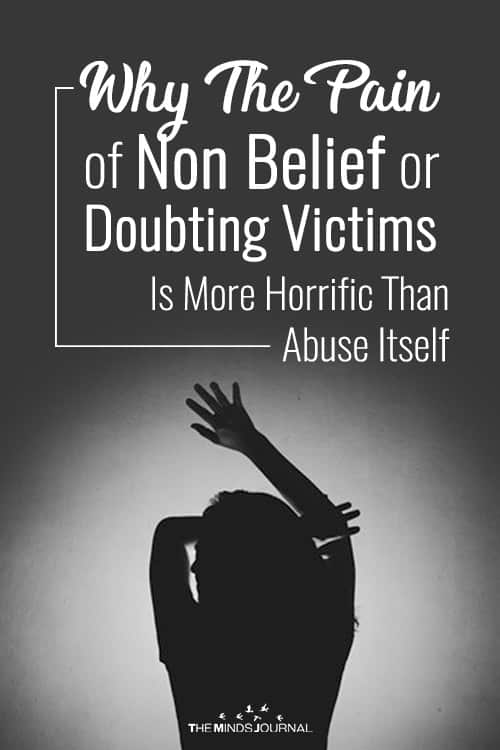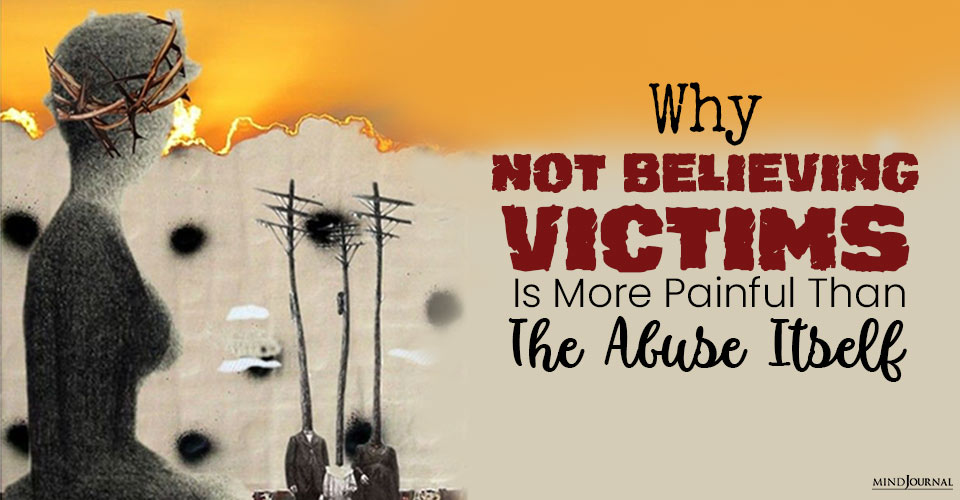The Pain of Not Believing Victims Of Abuse: Why it is more horrific than abuse. Victims doubting, or doubting victims of abuse can sometimes be more painful than the actual abuse itself. The pain of non belief and not believing abuse victims is one of the worst things we can do to them.
Not being believed, can sometimes feel even more painful than the abuse itself. And I am not invalidating, or minimizing the effect and consequences of abuse, by making this statement, at all.
What I am doing, is describing how incredibly painful and devastating it is to not be believed.
Related: 8 Heartbreaking Thoughts You Face As An Adult Survivor of Child Sexual Abuse
Why Not Believing Victims Of Abuse Is Incredibly Wrong And Painful
The abuse itself is horrific.
The pain of not being believed, of being neglected, and the emotional and psychological destruction that non belief by others, after enduring severe abuse, is even more horrific. Because it adds on top to the already massive weight of pain and devastation abuse causes.
They aren’t two separate issues. They are combined.
Non belief is like having the knife twisted.
The abuse being the knife being stuck in, the non belief being the severe pain of the knife being twisted in the already deeply painful wound.
I am only recently coming to understand the deep psychological effect of not having people you need in your life to believe you and decide to not believe you.
I’ve dealt with this my entire life, from childhood.
I’ve even had this with a whole load of religious people, having various levels of non belief about abuse I was completely honest in exposing. None of them believed me at the beginning of this whole issue. I think a few believe me now after lies were told in the internal investigation report. But people still minimize it. For their own needs, not mine.
Related: Can Men Be Victims Of Domestic Abuse?
My advice to anyone dealing with a person who says they have been abused is…
If you choose to doubt the victim, not believe them, assume the truth is somewhere between what the accused says and what the victim says…..but if the victim is being 100% honest – you are abusing the victim further – even if unintentionally.
If you choose to minimize what the victim has endured, and support the abuser, then you are abusing the victim further – even if unintentionally.
If you choose to make assumptions, blame that victim in some way for what occurred, judge them, blame their mental health, etc – and that victim is telling the truth – you are abusing them further – even if unintentionally.
We live in a society where it is ‘innocent until proven guilty’.
And also where is a victim is ‘lying/exaggerating’ unless they can prove the abuse 100%.
There are many who will argue we need to have innocent until proven guilty and I agree, we do. But, in the case of abuse victims – please know – this abuses and re-traumatizes them repeatedly.
And ‘not guilty’ or not having enough evidence to prove the abuse 100% – does not mean the victim was lying. Or that the abuser is innocent – but society wants to view it that way.
Related: Are You A Victim Of Narcissistic Abuse?
And regardless of all the arguments for all this……..bottom line, is it is devastating and is more abusive to the victim.
I know this because I have been there. Too many times.
~ Lilly Hope Lucario
Want to know more about the pain of not believing victims of abuse or doubting abuse victims? Check this video out below!
All blogs written by Lilly Hope Lucario and subject to © Copyright Protected.
All rights reserved. No part of any entry/blog may be reproduced, distributed, or transmitted in any form or by any means, including photocopying, copying, and pasting content, screenshots, recording, or other electronic or mechanical methods.
This includes adaptations in all forms of media.











Leave a Reply